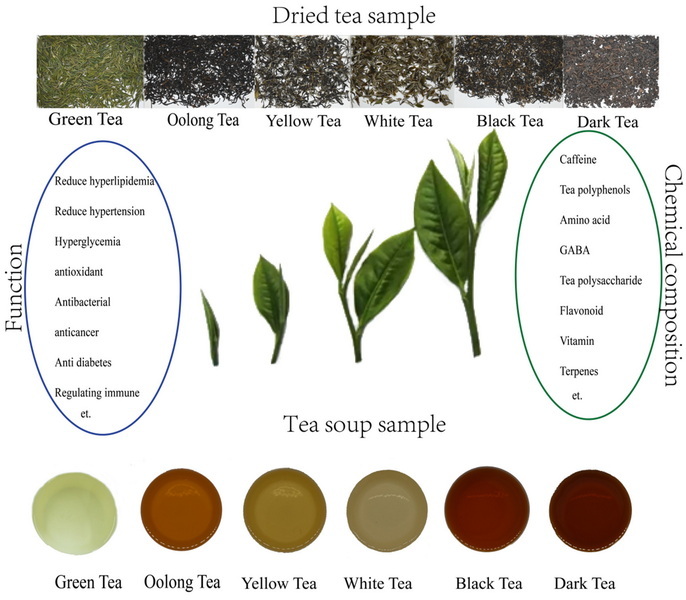Content Menu
● What is Green Tea Extract?
● Potential Benefits of Green Tea Extract
>> Antioxidant Properties
>> Weight Management
>> Heart Health
>> Brain Function
>> Cancer Prevention
● How to Take Green Tea Extract
● Potential Side Effects and Precautions
● Who Should Avoid Green Tea Extract?
● Choosing a Quality Green Tea Extract Supplement
● Alternatives to Green Tea Extract
● Incorporating Green Tea Extract into Your Lifestyle
● The Science Behind Green Tea Extract
● Green Tea Extract vs. Drinking Green Tea
>> Green Tea Extract:
>> Drinking Green Tea:
● Potential Interactions with Medications
● Green Tea Extract for Specific Health Conditions
● Sustainability and Ethical Considerations
● Conclusion
● Frequently Asked Questions
>> 1. How much green tea extract should I take daily?
>> 2. Can green tea extract help with weight loss?
>> 3. Are there any side effects of taking green tea extract?
>> 4. Can I take green tea extract if I'm pregnant or breastfeeding?
>> 5. How long does it take to see benefits from taking green tea extract?
● Citations:
Green tea has been consumed for thousands of years and is renowned for its potential health benefits. In recent years, green tea extract has gained popularity as a convenient way to harness these benefits in supplement form. But is green tea extract right for you? Let's explore the potential advantages, considerations, and scientific evidence surrounding this popular supplement.

What is Green Tea Extract?
Green tea extract is a concentrated form of green tea, typically available in capsules, powders, or liquid form. It contains high levels of polyphenols, particularly catechins, which are powerful antioxidants. The most abundant and well-studied catechin in green tea is epigallocatechin gallate (EGCG).
Potential Benefits of Green Tea Extract
Antioxidant Properties
Green tea extract is rich in antioxidants, which help protect cells from damage caused by free radicals. This may contribute to overall health and potentially reduce the risk of various chronic diseases.
Weight Management
Some studies suggest that green tea extract may boost metabolism and aid in fat burning. While not a magic solution for weight loss, it could potentially support weight management efforts when combined with a healthy diet and exercise.
Heart Health
Research indicates that green tea extract may help support cardiovascular health by potentially lowering blood pressure and improving cholesterol levels. However, more studies are needed to confirm these effects.
Brain Function
The combination of caffeine and L-theanine in green tea extract may help improve cognitive function, including memory and focus. Some studies also suggest potential neuroprotective effects.
Cancer Prevention
While research is ongoing, some studies suggest that the antioxidants in green tea extract may have cancer-fighting properties. However, it's important to note that more research is needed in this area.
How to Take Green Tea Extract
If you're considering taking green tea extract, it's essential to follow the recommended dosage on the product label or consult with a healthcare professional. Typically, doses range from 250-500 mg per day. It's often recommended to take green tea extract with meals to enhance absorption and reduce the risk of stomach upset.
Potential Side Effects and Precautions
While generally considered safe for most people, green tea extract can cause side effects in some individuals, especially when taken in high doses. These may include:
1. Caffeine-related side effects (jitters, insomnia, rapid heartbeat)
2. Stomach upset
3. Headaches
4. Potential liver toxicity (in rare cases with high doses)
It's important to be aware of the caffeine content in green tea extract, especially if you're sensitive to caffeine or taking other caffeinated products. Some green tea extract supplements are decaffeinated, which may be a better option for those concerned about caffeine intake.
Who Should Avoid Green Tea Extract?
Certain individuals should exercise caution or avoid green tea extract altogether:
- Pregnant or breastfeeding women
- People with liver problems
- Those taking blood thinners or certain other medications
- Individuals with iron deficiency anemia
Always consult with a healthcare professional before starting any new supplement regimen, especially if you have existing health conditions or are taking medications.
Choosing a Quality Green Tea Extract Supplement
When selecting a green tea extract supplement, consider the following factors:
1. Look for products standardized for EGCG content
2. Choose reputable brands that undergo third-party testing
3. Check for additional ingredients or fillers
4. Consider the caffeine content (if applicable)
Alternatives to Green Tea Extract
If you're unsure about taking green tea extract supplements, consider these alternatives:
1. Drinking green tea: Enjoy the benefits of green tea in its natural form
2. Matcha powder: A concentrated form of green tea with similar benefits
3. Other antioxidant-rich foods and beverages
Incorporating Green Tea Extract into Your Lifestyle
If you decide to try green tea extract, consider these tips for incorporating it into your daily routine:
1. Start with a lower dose and gradually increase if needed
2. Take it consistently for best results
3. Combine with a healthy diet and regular exercise
4. Monitor your body's response and adjust as necessary
The Science Behind Green Tea Extract
Numerous studies have been conducted on the potential health benefits of green tea and its extract. While many show promising results, it's important to note that more research is needed in some areas. Here's a brief overview of some key scientific findings:
1. Antioxidant effects: Multiple studies have demonstrated the potent antioxidant properties of green tea catechins, particularly EGCG.
2. Weight management: Some research suggests that green tea extract may increase fat oxidation and boost metabolism, potentially aiding in weight loss efforts.
3. Cardiovascular health: Several studies have shown potential benefits for heart health, including improvements in cholesterol levels and blood pressure.
4. Cognitive function: Research indicates that the combination of caffeine and L-theanine in green tea may enhance brain function and potentially protect against age-related cognitive decline.
5. Cancer prevention: While more research is needed, some studies suggest that green tea catechins may have anti-cancer properties.

Green Tea Extract vs. Drinking Green Tea
While green tea extract offers a convenient way to consume concentrated amounts of beneficial compounds, drinking green tea also has its advantages. Here's a comparison:
Green Tea Extract:
- Higher concentration of catechins
- Convenient for those who don't enjoy drinking tea
- Potentially more potent effects due to higher doses
Drinking Green Tea:
- More affordable
- Provides hydration
- Contains additional beneficial compounds that may be lost in processing
- Lower risk of side effects or toxicity
Ultimately, the choice between green tea extract and drinking green tea depends on personal preference, lifestyle, and health goals.
Potential Interactions with Medications
It's crucial to be aware of potential interactions between green tea extract and certain medications. Some notable interactions include:
1. Blood thinners (e.g., warfarin): Green tea may decrease the effectiveness of these medications.
2. Beta-blockers: The caffeine in green tea extract may interfere with these heart medications.
3. Antibiotics: Green tea may affect the absorption of certain antibiotics.
4. Iron supplements: Green tea can reduce iron absorption.
Always consult with your healthcare provider before taking green tea extract if you're on any medications.
Green Tea Extract for Specific Health Conditions
While more research is needed, some studies suggest that green tea extract may be beneficial for certain health conditions:
1. Metabolic syndrome: Some research indicates that green tea extract may help improve various aspects of metabolic syndrome, including insulin resistance and blood lipid levels.
2. Skin health: The antioxidants in green tea extract may help protect against UV damage and signs of aging when applied topically or taken orally.
3. Liver health: Some studies suggest that green tea extract may help protect the liver from damage, although high doses can also potentially cause liver toxicity.
4. Arthritis: The anti-inflammatory properties of green tea catechins may help reduce inflammation associated with arthritis.
5. Dental health: Green tea's antibacterial properties may help prevent tooth decay and improve oral health.
Sustainability and Ethical Considerations
When choosing green tea extract supplements, consider the environmental and ethical implications:
1. Look for sustainably sourced products
2. Choose brands that prioritize fair trade practices
3. Consider the packaging and its environmental impact
By making informed choices, you can support responsible production practices while potentially benefiting your health.
Conclusion
Green tea extract offers a concentrated form of the beneficial compounds found in green tea, potentially providing various health benefits. While research shows promise in areas such as antioxidant protection, weight management, and heart health, it's important to approach green tea extract supplementation with caution.
Before deciding to take green tea extract, consider your individual health status, medications, and lifestyle factors. Consult with a healthcare professional to determine if green tea extract is right for you and to ensure proper dosage and usage.
Remember that supplements should not replace a healthy diet and lifestyle. If you choose to incorporate green tea extract into your routine, do so as part of a balanced approach to health and wellness.

Frequently Asked Questions
1. How much green tea extract should I take daily?
The appropriate dosage can vary depending on the specific product and your individual needs. Generally, doses range from 250-500 mg per day. Always follow the recommended dosage on the product label or consult with a healthcare professional for personalized advice.
2. Can green tea extract help with weight loss?
While some studies suggest that green tea extract may boost metabolism and aid in fat burning, it's not a magic solution for weight loss. It may support weight management efforts when combined with a healthy diet and regular exercise, but results can vary among individuals.
3. Are there any side effects of taking green tea extract?
Some people may experience side effects, especially at higher doses. These can include caffeine-related effects (jitters, insomnia, rapid heartbeat), stomach upset, and headaches. In rare cases, high doses may lead to liver toxicity. It's important to start with a lower dose and monitor your body's response.
4. Can I take green tea extract if I'm pregnant or breastfeeding?
It's generally recommended that pregnant or breastfeeding women avoid green tea extract supplements due to their high caffeine content and potential effects on fetal development. Consult with your healthcare provider for personalized advice.
5. How long does it take to see benefits from taking green tea extract?
The time frame for experiencing benefits can vary depending on the individual and the specific health outcomes being measured. Some effects, such as increased alertness, may be noticed relatively quickly, while others, like potential improvements in cholesterol levels, may take several weeks or months of consistent use to become apparent.
Citations:
[1] https://www.healthline.com/nutrition/10-benefits-of-green-tea-extract
[2] https://pubmed.ncbi.nlm.nih.gov/38031409/
[3] https://www.urmc.rochester.edu/encyclopedia/content?contenttypeid=19&contentid=GreenTeaExtract
[4] https://www.alamy.com/stock-photo/green-tea-extract.html
[5] https://www.youtube.com/watch?v=eMuE16vLV_s
[6] https://www.youtube.com/watch?v=t4Gcrc9lMog
[7] https://www.medicalnewstoday.com/articles/269538
[8] https://www.elo.health/articles/green-tea-extract-supplements/
[9] https://www.freepik.com/free-photos-vectors/green-tea-extract
[10] https://www.mountsinai.org/health-library/herb/green-tea






























